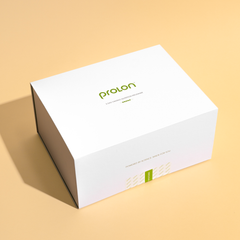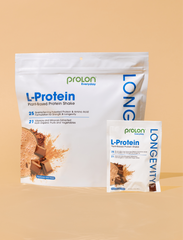
IGF-1 Explained: The Growth Signal That Could Be Aging You
Key takeaways:
-
IGF-1 is a powerful hormone that drives cellular, muscular, organ, and bone growth and repair, but chronically high levels can also accelerate aging and disease.
-
While excessive consumption of animal protein can overstimulate IGF-1 and accelerate aging, plant-based protein supports healthy growth, repair and recovery with a gentler impact on aging pathways.
-
Plant-based protein like that found in Prolon’s longevity protein products supports muscle health and recovery without overstimulating IGF-1
What you eat every day has the power to influence how quickly—or how slowly—your body ages.
A key player in this process is IGF-1 (Insulin-like growth factor 1). This hormone helps you grow and build strength in your younger years, but when levels remain too high over time, it can accelerate aging. Because IGF-1 is highly responsive to both what and how much you eat, your nutrition choices play a key part in keeping it in balance.
IGF-1 is essential for growth in childhood and supports muscle, bone and tissue health throughout life. The challenge comes when levels stay chronically elevated; research shows it can put your cells into overdrive, prioritizing growth and division instead of long-term repair. Over time, that imbalance is tied to accelerated aging and greater risk for chronic disease. To keep it in check, it’s important to understand how this hormone works and how your daily nutrition plays a role.
Getting to know IGF-1
IGF-1 is a hormone made mostly in your liver in response to growth hormone (GH); together, the two act like a team, driving cell growth, repair and regeneration throughout your body. IGF-1 is especially important in childhood, helping bones get longer, muscles get stronger and tissues to heal. As you get older, IGF-1 continues to help you maintain muscle, support bone strength and recover from everyday wear and tear.
But IGF-1 isn’t just about growth. It also acts as a messenger, letting your cells know when food, especially protein, is available. When IGF-1 levels are high, your body gets the signal to grow and multiply. And that is where things may get tricky. In the right amounts, IGF-1 is essential for strength, repair and vitality; however, when it stays elevated too often, that constant “growth” signal keeps firing even when there’s nothing left to repair, speeding up cellular aging and making the body more vulnerable to chronic disease.
The two sides of IGF-1
IGF-1 is a bit of a paradox. On one hand, it’s essential for keeping you strong as a key component of growth and repair, on the other, studies suggest prolonged high IGF-1 levels may accelerate aging and increase your risk for chronic disease. The key is learning how to get the best of its benefits without tipping too far into the risks. This is why scientists like Dr. Valter Longo, director of the Longevity Institute at USC and creator of the Fasting Mimicking Diet, emphasizes the importance of keeping IGF-1 at a moderate, not excessive, level. The goal is not to eliminate IGF-1, but to strike the balance that supports strength while also protecting long-term health.
The pro-growth side of IGF-1
When IGF-1 is in a healthy range (which changes throughout the lifespan), it acts as a powerful driver of vitality and recovery within the body. Healthy IGF-1 levels can work to:
-
Build and maintain muscle mass: IGF-1 helps your muscles grow and repair, supporting strength, stamina and mobility at any age.
-
Support bone density: By stimulating bone-building cells, IGF-1 contributes to stronger bones and protects against fractures.
-
Speed up wound healing and recovery: IGF-1 plays a critical role in tissue repair, helping your body recover from injuries, surgeries or intense exercise.
The pro-aging side of IGF-1
When IGF-1 levels remain chronically elevated, the constant stimulation keeps your body in “growth mode.” This may sound positive but comes with hidden costs like:
-
Draining your cells of energy: Constant growth takes a lot of fuel, which means less energy is left over for repair and recovery.
-
Increasing the risk of DNA mistakes: The more often cells divide, the greater the chance for errors to slip in and build up over time.
-
Sending pro-aging proteins like mTOR into overdrive: IGF-1 can keep mTOR switched on, which speeds up wear-and-tear in cells and throws off your body’s natural balance.
-
Heightened risk of chronic disease: Long-term overstimulation of IGF-1 is linked to higher risks of cancer, type 2 diabetes and cardiovascular disease.
How does diet influence IGF-1?
While IGF-1 responds to many factors in your environment, science tells us that food is one of the most powerful levers we have for influencing IGF-1. This means your daily diet is constantly shaping whether IGF-1 is working for your long-term health or quietly pushing you toward accelerated aging.
The protein/IGF-1 link
Among all nutrients, protein has the strongest impact on IGF-1 levels. When you eat protein, your body senses the abundance of amino acids and boosts IGF-1 to stimulate growth and repair. IGF-1 then works hand-in-hand with mTOR, a key regulator of protein synthesis and metabolism. Together, IGF-1 and mTOR drive muscle building and tissue repair. But when IGF-1 levels are pushed too high (which is more likely to happen during adulthood) this process can sometimes backfire, accelerating aging and raising the risk of disease.
Alternatively, too little protein is also harmful and can disrupt the delicate IGF-1 balance within the body. Without enough protein, your body can start breaking down muscle, leading to weakness, frailty and poor metabolic health. In fact, a large 2022 study of more than 30,000 adults found a “U-shaped” effect: both very low and very high IGF-1 levels were linked to a higher risk of death. The sweet spot, the place where health and longevity outcomes look their best, sits right in the middle of the chart.
Animal vs. plant protein: which is better for IGF-1?
Not all protein sources affect IGF-1 in the same way. Animal proteins, including eggs, whey, casein, and red meat, are shown to stimulate IGF-1 more aggressively because they are rich in branched-chain amino acids (BCAAs), including arginine, which may enhance the liver’s production of IGF-1. While these amino acids can help build muscle, too much may overstimulate the growth pathways tied to aging and disease.
In contrast, plant proteins are often shown to create a more balanced IGF-1 response. They provide adequate amino acids for repair and maintenance without pushing IGF-1 into the high ranges associated with risk. This effect is further supported by the synergistic nutrients found in plants, like fiber, polyphenols and antioxidants, which can help steady insulin signaling and keep IGF-1 in balance. This is one reason why plant-forward nutrition, such as the Longevity Diet developed by Dr. Longo is linked to better long-term health and increased longevity.
Simple shifts, like eating more plant-based proteins and being mindful of how much protein you get overall, can help keep IGF-1 in balance and have a sizable impact on your long-term health.
Longevity Protein: Muscle support without overstimulation
With this in mind, Prolon created L-Protein, formulated to support muscle health while minimizing IGF-1 overstimulation. This plant-based, science-backed alternative to traditional protein powders helps nourish your body without the pro-aging risks often linked to excess protein. With 25g of complete, plant-based protein, it can be used as a full meal replacement for daily use or post-workout recovery, making it easy to hit your daily protein goals while also staying on track with your long-term longevity goals. Even just swapping one daily serving of animal protein for this plant-based powerhouse can help support healthy aging.
Fasting to lower IGF-1
Beyond the protein you consume, fasting can also have a big impact on balancing IGF-1 levels. When the body is in a fasted state, IGF-1 levels drop naturally. This is especially true during prolonged fasting like the FMD when IGF-1 levels shift from “growth mode” to “repair and maintenance mode.”
“Suppressing growth through fasting isn’t a loss - it’s a strategic pause. When IGF-1 levels drop, the body diverts its energy away from building new cells and toward protecting the ones it already has. This shift activates pathways of maintenance and repair - the body’s built-in defense mechanisms that clear out damaged components, stabilize metabolism, and support longevity at the cellular level. In other words, by intentionally slowing growth, fasting creates the space for healing.” - Melanie Murphy Richter, MS, RDN.
During repair mode, autophagy (the body’s natural cellular cleanup process) is activated. Damaged cells are recycled while healthy ones are preserved, allowing your system to function more efficiently and resist age-related decline. Research consistently links lower average IGF-1 with longer lifespans and reduced risk of chronic disease, making fasting an effective way to support health and longevity.
Prolon: A powerful tool for IGF-1 balance
The challenge, of course, is how to safely and consistently access these fasting benefits. Based on decades of research, Prolon’s 5-Day Fasting Mimicking Diet (FMD) is intended to do just that – providing nourishment while still lowering IGF-1 (just like a water-only fast but without total food deprivation). By reducing protein and delivering carefully calibrated plant-based nutrients, Prolon activates the body’s natural repair processes while keeping you fueled. This unique balance makes it a practical, science-backed way to reset IGF-1 and support healthy aging.
In fact, clinical studies show that three monthly cycles of Prolon’s FMD can reduce biological age by an average of 2.5 years. Trials also demonstrate improvements in metabolic markers, reductions in visceral fat and healthier IGF-1 signaling.
Keeping IGF-1 on your side
IGF-1 is one of the body’s most important hormones; the goal is not to eliminate it, but to keep it in balance so you can benefit from its strengths without the downsides. The good news is that being mindful of protein quality and amount, and using science-backed tools like the Prolon’s FMD and Longevity Protein, can help you keep IGF-1 working for you as you build a foundation for a longer, healthier life.
Sources:
Nature.com: Fasting-mimicking diet causes hepatic and blood markers changes
NIH.gov: Association between IGF‐1 levels ranges and all‐cause mortality: A meta‐analysis
NIH.gov: The key role of growth hormone — insulin — IGF-1 signaling in aging and cancer
Urmc.rochester.edu: Insulin-Like Growth Factor













